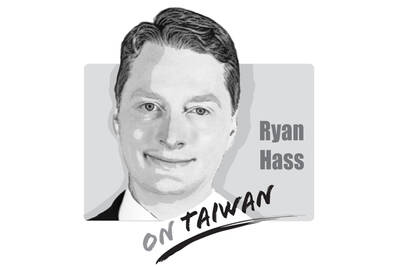The National Land Management Agency on Tuesday announced that it was considering adding exterior wall inspections to routine building safety evaluations to tackle the ongoing issue of loose tiles falling from structures. The move followed the Control Yuan censuring the Ministry of the Interior over a lack of comprehensive regulations and oversight on the inspection and maintenance of exterior wall finishes, a shortcoming that has contributed to recurring incidents of falling tiles from aging buildings.
Ministry data showed that nearly 59 percent of residential properties — about 5.5 million homes nationwide — are more than 30 years old and face aging-related risks. The issue is especially acute in Taipei, where nearly half of the homes are more than 40 years old, with almost one in five exceeding 50 years. Meanwhile, urban renewal efforts have not kept pace with the growing number of aging buildings.
These structures were built before the modern earthquake-resistant standards implemented in 1999 following the 921 Earthquake. As a result, they are more vulnerable to structural damage from natural disasters. When a magnitude 7.2 earthquake struck Hualien last year, it damaged 430 buildings nationwide. While most of the damage was in Hualien, one red-tagged building was in Taipei — far from the quake’s epicenter.
However, as the Control Yuan’s censure highlighted, the dangers of aging buildings go beyond structural integrity or earthquake resistance. Falling tiles and crumbling concrete from deteriorating exteriors frequently cause injuries and property damage, underscoring the urgent need for improved maintenance and inspections. In March, a piece of concrete fell from a building on Linsen N Road in Taipei, hitting a car’s roof and injuring a child in the backseat.
Although the government has introduced financial incentives and urban renewal programs to replace or upgrade aging structures, progress remains slow. Meanwhile, the number of homes aged 30 years or older increased by nearly 400,000 — almost 4 percent — in the past three months alone. Redevelopment is costly and complex, especially in Taipei, where high property values and strict zoning laws discourage many owners from renovating.
Taiwan’s rapidly aging population complicates the situation. Many older residential buildings lack elevators, creating serious accessibility issues for elderly residents and others with mobility impairments. Taipei is now a “super-aged” city, with more than 90 percent of its districts having at least 20 percent of residents aged 65 or older. Nationwide, more than half of Taiwan’s 368 administrative regions have reached this status. Without renovations to include elevators or barrier-free designs, many elderly residents face daily hardships navigating their homes and communities.
A comprehensive strategy is needed to address the growing safety risks and accessibility challenges posed by aging buildings. Not only should the National Land Management Agency follow through with requiring regular inspections of exterior wall finishes, but property owners who fail to carry out mandatory inspections or repairs should face stricter penalties, including fines or liability in the event of injuries or damage. Incentive programs should also be expanded and improved to encourage timely renovations and reconstruction. Policies should tackle the economic and bureaucratic barriers deterring property owners from upgrading. Subsidies, tax breaks and streamlined approval processes could reduce costs and accelerate redevelopment, especially in dense urban areas where delays are most significant.
Taiwan faces a complex housing challenge marked by aging buildings, growing safety risks, poor accessibility and stalled redevelopment. Addressing these challenges is a matter of public safety, and key to promoting social equity and improving quality of life. Rather than quick fixes, a clear timeline and coordinated policies on effective urban renewal are needed.

There has been much catastrophizing in Taiwan recently about America becoming more unreliable as a bulwark against Chinese pressure. Some of this has been sparked by debates in Washington about whether the United States should defend Taiwan in event of conflict. There also were understandable anxieties about whether President Trump would sacrifice Taiwan’s interests for a trade deal when he sat down with President Xi (習近平) in late October. On top of that, Taiwan’s opposition political leaders have sought to score political points by attacking the Lai (賴清德) administration for mishandling relations with the United States. Part of this budding anxiety
The diplomatic dispute between China and Japan over Japanese Prime Minister Sanae Takaichi’s comments in the Japanese Diet continues to escalate. In a letter to UN Secretary-General Antonio Guterres, China’s UN Ambassador Fu Cong (傅聰) wrote that, “if Japan dares to attempt an armed intervention in the cross-Strait situation, it would be an act of aggression.” There was no indication that Fu was aware of the irony implicit in the complaint. Until this point, Beijing had limited its remonstrations to diplomatic summonses and weaponization of economic levers, such as banning Japanese seafood imports, discouraging Chinese from traveling to Japan or issuing
On Nov. 8, newly elected Chinese Nationalist Party (KMT) Chairwoman Cheng Li-wun (鄭麗文) and Vice Chairman Chi Lin-len (季麟連) attended a memorial for White Terror era victims, during which convicted Chinese Communist Party (CCP) spies such as Wu Shi (吳石) were also honored. Cheng’s participation in the ceremony, which she said was part of her efforts to promote cross-strait reconciliation, has trapped herself and her party into the KMT’s dark past, and risks putting the party back on its old disastrous road. Wu, a lieutenant general who was the Ministry of National Defense’s deputy chief of the general staff, was recruited
Tokyo-Beijing relations have been rapidly deteriorating over the past two weeks as China tries to punish Japan over Japanese Prime Minister Sanae Takaichi’s remarks about Taiwan earlier this month, and the off-ramp to this conflict is yet to be seen. Takaichi saying that a “Taiwan contingency” could cause a “situation threatening Japan’s survival” — which would allow Japan to act in self-defense — has drawn Beijing’s ire and sparked retaliatory measures. Her remark did not gain public attention until Chinese Consul General in Osaka Xue Jian (薛劍) made an apparent threat to behead her. The two sides lodged protests against each